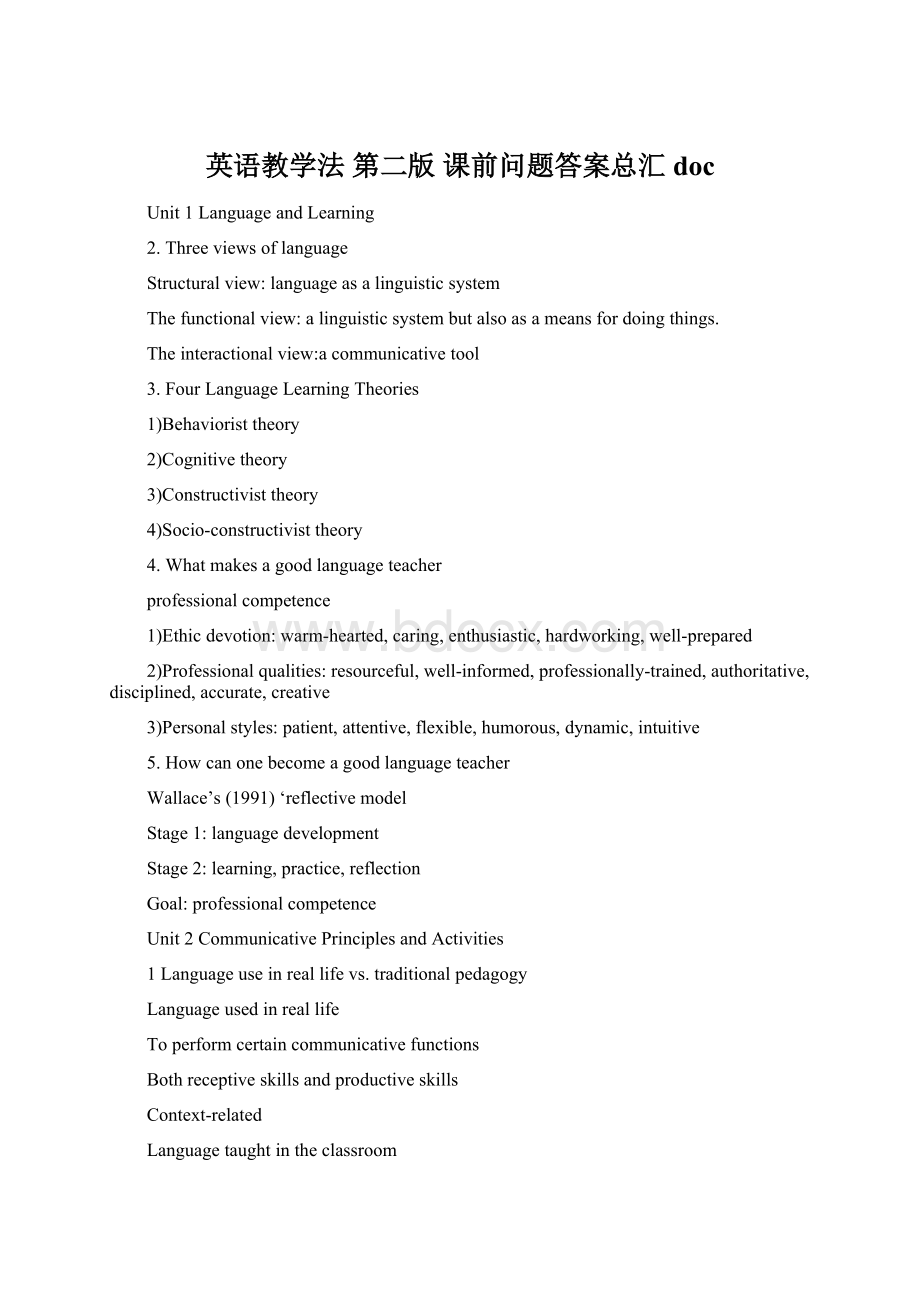英语教学法 第二版 课前问题答案总汇docWord格式.docx
《英语教学法 第二版 课前问题答案总汇docWord格式.docx》由会员分享,可在线阅读,更多相关《英语教学法 第二版 课前问题答案总汇docWord格式.docx(16页珍藏版)》请在冰豆网上搜索。

Wallace’s(1991)‘reflectivemodel
Stage1:
languagedevelopment
Stage2:
learning,practice,reflection
Goal:
professionalcompetence
Unit2CommunicativePrinciplesandActivities
1Languageuseinreallifevs.traditionalpedagogy
Languageusedinreallife
Toperformcertaincommunicativefunctions
Bothreceptiveskillsandproductiveskills
Context-related
Languagetaughtintheclassroom
Tofocusonforms(structuresorpatterns
Tofocusononeortwolanguageskillsandignoretheother
Toisolatelanguagefromitscontext
2.ThegoalofCLT
ThegoalofCLTistodevelopstudents'
communicativecompetence,
2Whatiscommunicativecompetence
boththeknowledgeaboutthelanguageandtheknowledgeabouthowtousethelanguageappropriatelyincommunicativesituations
3.Fivecomponentsofcommunicativecompetence
1)Linguisticcompetence,
2)Pragmaticcompetence,
3)Discoursecompetence,
4)Strategiccompetence
5)Fluency
3.Implicationsforteachingandlearning:
(同上)
4.Principlesincommunicativelanguageteaching
1)Communicationprinciple:
Activitiesthatinvolverealcommunicationpromotelearning.
2)Taskprinciple:
Activitiesinwhichlanguageisusedforcarryingoutmeaningfultaskspromotelearning.
3)Meaningfulnessprinciple:
Languagethatismeaningfultothelearningsupportsthelearningprocess.
-_-||
4.Mainfeaturesofcommunicativeactivities
Aclassificationofcommunicativeactivities
1)Functionalcommunicativeactivities
Identifyingpictures
Discoveringidenticalpairs
Discoveringsequencesorlocations
Discoveringmissinginformation
Followingdirections
Reconstructingstory-sequences
…
2)Socialinteractionactivities
Role-playingthroughcueddialogues
Role-playingthroughdebateordiscussion
Large-scalesimulationactivities
….
Sixcriteriaforevaluatingcommunicativeactivities
1)Communicativepurpose
2)Communicativedesire
3)Content,notform
4)Varietyoflanguage
5)Noteacherintervention
6)Nomaterialscontrol
TBLT:
afurtherdevelopmentofcommunicativelanguageteaching.itsharethesamebeliefs,aslanguageshouldbelearnedascloseaspossibletohowitisusedinreallife.however,itstressedtheimportancetocombineform-focusedteachingwithcommunication-focusedteaching
Ataskisbelievedtohavefourcomponents:
1)apurpose,2)acontext,3)aprocess,4)aproduct.
6.DifferencesbetweenPPPandTBLT
1.Thewaystudentsuseandexperiencelanguage
2.TBLcanprovideacontextforgrammarteachingandform-focusedactivities
7.ProblemswithCLT
1.IsitpracticalintheChinesecontext?
2.Howtodesignthesyllabusforclassroomteaching?
3.Isitsuitableforallageleveloflearnersorallcompetenceleveloflearners?
7.ConstraintsofTBLT
1.Itmaynotbeeffectiveforpresentingnewlanguageitems
2.Time:
teachershavetopreparetask-basedactivitiesverycarefully.
3.Cultureoflearning
4.Levelofdifficulty
Unit3NationalEnglishCurriculum
3.1AbriefhistoryofforeignlanguageteachinginChina
1)Aphaseofrestoration(1978-1985)
2)Aphaseofrapiddevelopment(1986-1992)
3)Aphaseofreform(1993-2000)
4)Aphaseofinnovationfrom2000
2,DesigningprinciplesfortheNationalEnglishCurriculum
1)Aimforeducatingallstudents,andemphasizequality-orientededucation.
2)Promotelearner-centeredness,andrespectindividualdifferences.
3)Developcompetence-basedobjectives,andallowflexibilityandadaptability
4)Paycloseattentiontothelearningprocess,andadvocateexperientiallearningandparticipation
5)Attachparticularimportancetoformativeassessment,andgivespecialattentiontothedevelopmentofcompetence.
6)Optimizelearningresources,andmaximizeopportunitiesforlearningandusingthelanguage.
3.3GoalsandobjectivesofEnglishlanguageteaching
Thenewcurriculumisdesignedtopromotestudents’overalllanguageability
3.4DesignoftheNationalEnglishCurriculum
Ninecompetence-basedlevels
Level2,For6thgraders-_-z
Level5,For9thgraders
Level7,Forseniorhighschoolleavers
Unit4LessonPlanning
1.whatisaLessonplan
aLessonplanisaframeworkofalessoninwhichteachersmakeadvancedecisionsaboutwhattheyhopetoachieveandhowtheywouldliketoachieveit
1.Whyislessonplanningimportant?
1)Makesteachersawareoftheaimsandlanguagecontentsofthelesson,
2)Helpsteachersdistinguishthevariousstagesofalessonandseetherelationshipbetweenthem
3)Givesteacherstheopportunitytoanticipatepotentialproblemssothattheycanbeprepared;
4)Givesteachers,esp.noviceones,confidenceinclass;
5)Raisesteachers’awarenessoftheteachingaidsneeded;
6)Planningisagoodpracticeandasignofprofessionalism
2.Principlesforgoodlessonplanning
1)Aim,2)Variety,3)Flexibility,4)Learnability,5)Linkage
3.Macroplanningvs.microplanning
Macroplanning;
isplanningovertime
microplanning:
isplanningforaspecificlesson
3Macroplanninginvolves:
1)Knowingaboutthecourse:
2)Knowingabouttheinstitution:
3)Knowingaboutthelearners:
4)Knowingaboutthecurriculum/syllabus
5)Knowingaboutthetextbook
6)Knowingabouttheobjectives
4.Componentsofalessonplan
1)Backgroundinformation
2)Teachingaims
3)Languagecontentsandskills
4)Stagesandprocedures
5)Teachingaids
6)endoflessonsummary
7)optionalactivitiesandAssignments
8)after-lessonreflection
5.Samplelessonplans
Unit5ClassroomManagement
1.Whatrolesdoestheteacherplay
Beforetheclass---Planner
Duringtheclass---1Controller,2Assessor,3Organizer,4Prompter,5Participant,6Resource-provider
Aftertheclass---Evaluator
newroles:
facilitators,guides,researchers
2.Rulestofollowformakinginstructionseffective
Tousesimpleinstructionsandmakethemsuitthecomprehensionlevelofthestudents.
Tousethemother-tongueonlywhenitisnecessary.
3.WhatarethemostcommontypesofSsgrouping?
Wholeclasswork
Pairwork,
Groupwork,
Individualstudy:
4.Howtomaintaindiscipline?
P.79
Whenstudentsareengagedinlearning,theywillbedisciplined.
Q:
Howtoengagestudentsinlearning?
1)Ssareclearaboutlearningpurpose;
2)Ssareabletodotheworkbutfinditchallenging;
3)Ssareemotionally,physicallyandintellectuallyinvolvedbythetasks;
4)Thepresentation,varietyandstructureoftheworkandactivitiesgeneratecuriosityandinterest;
5)Sshaveopportunitiestoaskquestionsandtryoutideas;
6)Sscanseewhattheyhaveachievedandhowtheyhadmadeprogress;
7)Ssgetafeelingofsatisfactionandenjoymentfromthework.
4Harmer’ssuggestionsonmeasuresforundisciplinedactsandbadlybehavingSs
1).Actimmediately
2).Stoptheclass
3).Rearrangetheseats
4).Changetheactivity
5).TalktoSsafterclass
6).creatacodeofbehavior
4.InordernottohurttheSs,Ur’sadviceonproblemsinclass:
1).Dealwithitquietly
2).Don’ttakethingspersonally
3).Donotusethreats
5Howtoaskeffectivequestion
1)Questionsshouldbecloselylinkedtothelearningobjectivesinthelesson;
2)Questionsshouldbestagedsothatthelevelofchallengeincreasesasthelessonproceeds;
3)Thereshouldbeabalancebetweenclosedandopen,lower-orderandhigher-orderquestions;
4)Waittimeisimportanttoallowstudentstothinkthroughtheiranswers;
5)Ssshouldbeprovidedopportunitiestoasktheirownquestionsandseektheirownanswers;
6)Asecureandrelaxedatmosphereoftrustisneededandss’opinionsandideasarevalued.
6.correctdealingwitherrorsandmistakes
weneedtobeclearwhetherthetaskoractivityisfocusingonaccuracyorfluency.
Howtocorrecterror:
1)Directteachercorrection
2)Indirectteachercorrection
3)Selfcorrection
4)Peercorrection
5)Wholeclasscorrection
Unit6TeachingPronunciation
1.Theroleofpronunciation
Onthevalueofteachingpronunciation,therearedifferentopinions:
1.Studentsdonotneedtolearnpronunciationbecausepronunciationwilltakecareofitselfasthestudentsdevelopoveralllanguageability.
2.Failureinpronunciationisagreathindrancetolanguagelearn.
2.Thegoalsofteachingpronunciation:
目的
1)Consistency连贯性:
Tobesmoothnatural
2)Intelligibility可理解性:
Tobeunderstandabletothelisteners
3)Communicativeefficiency:
Tohelpconveythespeakers’meaning
3.Threeaspectsofpronunciationtoteach?
Stress,intonation,rhythm
5.Waysofpracticingsounds
Perceptionpractice:
Usingminimalpairs,Whichorder,Sameordifferent,Oddoneout,Completion
Productionpractice:
Listenandrepeat,Fillintheblanks,Makeupsentences,Usemeaningfulcontext,Usepictures,Usetonguetwisters
6.Practicingstress:
Usegestures,usethevoice,usetheblackboard
7.Practicingintonation:
Usehandorarmmovementtoindicatechangeofintonaton
rising/fallingarrows;
drawlines
Unit7.TeachingGrammar
1.Theroleofgrammarinlanguagelearning
Generallyspeaking,ChineseEFLlearnersneedacertaindegreeofmasteryofEnglishgrammar(